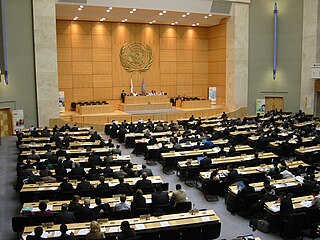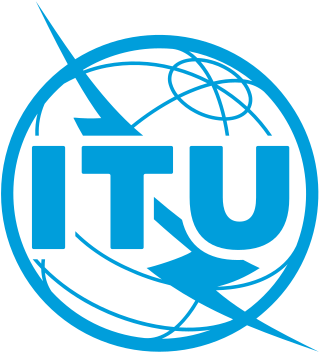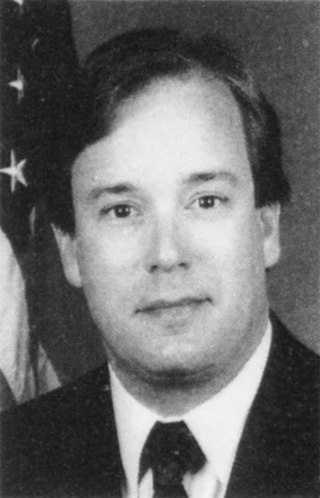
The European Conference of Postal and Telecommunications Administrations (CEPT) was established on June 26, 1959, by nineteen European states in Montreux, Switzerland, as a coordinating body for European state telecommunications and postal organizations. The acronym comes from the French version of its name, Conférence européenne des administrations des postes et des télécommunications.
Telecommunications in Guatemala include radio, television, fixed and mobile telephones, and the Internet.
The International Telecommunication Union Telecommunication Standardization Sector (ITU-T) is one of the three Sectors (branches) of the International Telecommunication Union (ITU). It is responsible for coordinating standards for telecommunications and Information Communication Technology, such as X.509 for cybersecurity, Y.3172 and Y.3173 for machine learning, and H.264/MPEG-4 AVC for video compression, between its Member States, Private Sector Members, and Academia Members.

The International Telecommunication Union (ITU) is a specialized agency of the United Nations responsible for many matters related to information and communication technologies. It was established on 17 May 1865 as the International Telegraph Union, significantly predating the UN and making it the oldest UN agency. Doreen Bogdan-Martin is the Secretary-General of ITU, the first woman to serve as its head.

The World Summit on the Information Society (WSIS) was a two-phase United Nations-sponsored summit on information, communication and, in broad terms, the information society that took place in 2003 in Geneva and in 2005 in Tunis. WSIS Forums have taken place periodically since then. One of the Summit's chief aims is to bridge the global digital divide separating rich countries from poor countries by increasing internet accessibility in the developing world. The conferences established 17 May as World Information Society Day.
The World Summit Awards (WSA) rewards Information and Communications Technologies projects that have a positive impact on society at the local level. The award was initiated in 2003, within the framework of the United Nations World Summit on the Information Society. After the UN General Assembly adopted Resolution 56/183. The awards are open to companies, organizations, or individuals from any of the UN and the UNESCO Member States. They are divided into 8 different categories. The world summit awards are managed by the International Center for New Media (ICNM), a non-profit organization based in Salzburg, Austria. ICNM was founded by Peter A. Bruck, in 2002.

Spectrum management is the process of regulating the use of radio frequencies to promote efficient use and gain a net social benefit. The term radio spectrum typically refers to the full frequency range from 1 Hz to 3000 GHz that may be used for wireless communication. Increasing demand for services such as mobile telephones and many others has required changes in the philosophy of spectrum management. Demand for wireless broadband has soared due to technological innovation, such as 3G and 4G mobile services, and the rapid expansion of wireless internet services.

World Telecommunication and Information Society Day is an international day proclaimed in November 2006 by the International Telecommunication Union Plenipotentiary Conference in Antalya, Turkey, to be celebrated annually on 17 May.
The International Centre for Missing & Exploited Children (ICMEC), headquartered in Alexandria, Virginia, USA, with a regional presence in the United Kingdom, Europe, Turkey, Africa, Canada, Latin America, Caribbean, Southeast Asia, India, Japan, South Korea, Taiwan and Australasia, is a private 501(c)(3) non-governmental, nonprofit global organization. It combats child sexual exploitation, child pornography, child trafficking and child abduction.

Thomas Leland Siebert is an American lawyer and former diplomat. He was born to Virgil and Evelyn Siebert in Cleveland, Ohio, the second of four sons. Siebert was appointed United States Ambassador to Sweden in 1994 by President Bill Clinton and served in this capacity until 1998.
The following outline is provided as an overview of and topical guide to the United Nations:

Hamadoun Ibrahim Touré of Mali was Secretary General of the International Telecommunication Union (ITU), the specialized agency of the United Nations dedicated to information and communication technologies (ICTs), from 2007 to December 2014. He was re-elected for a second four-year term in 2010. Since 2007, he has worked to fulfil ITU's mandate to 'connect the world' and help achieve the Millennium Development Goals.

Malcolm Johnson is a British civil servant. He is the Deputy Secretary-General of the ITU and former Director of the Telecommunication Standardization Bureau (TSB) of the ITU Standardization Sector (ITU-T). He was elected Director by the ITU Plenipotentiary Conference, 2006 in Antalya, Turkey. He took office on 1 January 2007 and was re-elected at the ITU Plenipotentiary Conference 2010. At the ITU Plenipotentiary Conference 2014 in Busan, he was elected to a term as Deputy Secretary-General, and at the 2018 ITU Plenipotentiary Conference in Dubai, he was reelected to a second term.
The Global Standards Collaboration (GSC) started life as The Inter-regional Telecommunications Standards conference (ITSC) in 1990. This was an initiative of the T1 Committee of the United States who invited the other founding partner organizations ITU-T, ETSI and the Japanese TTC to the first ISC Meeting in Fredericksburg, VA. The goal was set by the “spirit of Melbourne”, stemming from a CCITT Plenary Assembly, to find a way of co-operation between Participating Standards Organizations (PSOs) from different regions of the world in order to facilitate global standardization within the ITU. The ITSC focussed its work on fixed telecommunications networks.

The Asia Pacific Telecommunity (APT) was founded on the joint initiatives of the United Nations Economic and Social Commission for Asia and the Pacific (UNESCAP) and the International Telecommunication Union (ITU).
The Institute of Space and Telecommunications Law (IDEST) was founded in 2000 under the initiative of professionals in the space and telecommunication sectors. The institute is attached to the Interdisciplinary College of Research at the University of Paris-Sud. IDEST is made up of a number of lecturers, professors, PhD students, and researchers under the control of a scientific counsel composed of professors and key figures in the sectors involved.

Houlin Zhao is a Chinese engineer who served as the Secretary-General of the International Telecommunication Union (ITU) from 2015 to 2022. He was first elected at the 2014 Plenipotentiary Conference in Busan, and re-elected at the 2018 Plenipotentiary Conference in Dubai. ITU is the specialized United Nations Agency for Information and Communication Technology (ICT), working on promotion, collaboration, and standardization.

AI for Good was established in 2017 by the International Telecommunication Union (ITU), the United Nations (UN) agency for digital technologies. The platform is co-convened with the Government of Switzerland and in partnership with over 40 UN agencies. Its self-declared mission is to use artificial intelligence (AI) to help achieve the UN Sustainable Development Goals (SDGs).
Richard E. Butler was an Australian public servant who was the secretary-general of the International Telecommunication Union from 1983 to 1989. He was also its deputy secretary-general from 1974 to 1982, and in an ad interim tenure from 1968 to 1973.
The expression Plenipotentiary Conference is used to refer to some diplomatic conference integrated by diplomats invested with the full power of independent action on behalf of their country's government. In the United Nations system, the UN Economic and Social Council is vested with the power to call plenipotentiary conferences under Article 62(4) of the Charter of the United Nations.










